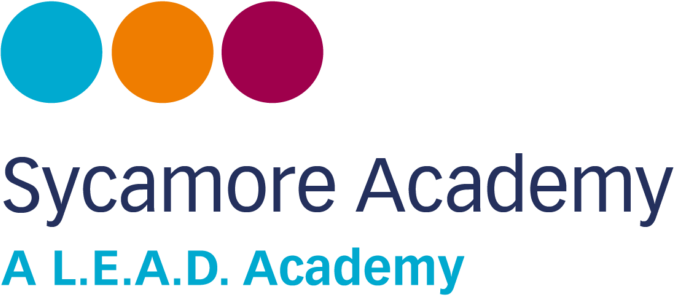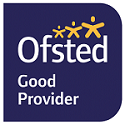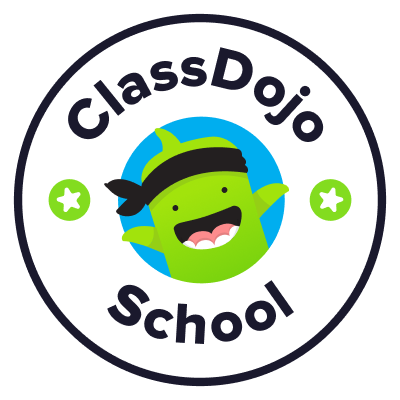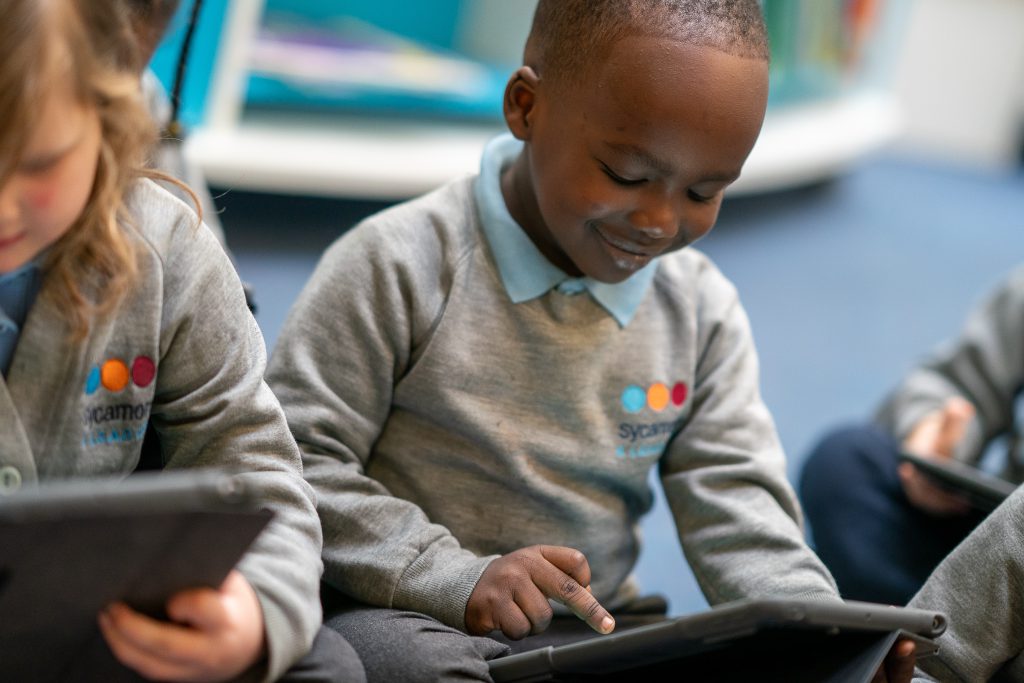
Our Computing curriculum is underpinned by the National Curriculum Program of Study 2014.
Purpose of study
A high-quality computing education equips pupils to use computational thinking and creativity to understand and change the world. Computing has deep links with mathematics, science, and design and technology, and provides insights into both natural and artificial systems. The core of computing is computer science, in which pupils are taught the principles of information and computation, how digital systems work, and how to put this knowledge to use through programming. Building on this knowledge and understanding, pupils are equipped to use information technology to create programs, systems and a range of content. Computing also ensures that pupils become digitally literate – able to use, and express themselves and develop their ideas through, information and communication technology – at a level suitable for the future workplace and as active participants in a digital world.
Aims
The national curriculum for computing aims to ensure that all pupils:
- can understand and apply the fundamental principles and concepts of computer science, including abstraction, logic, algorithms and data representation
- can analyse problems in computational terms, and have repeated practical experience of writing computer programs in order to solve such problems
- can evaluate and apply information technology, including new or unfamiliar technologies, analytically to solve problems
- are responsible, competent, confident and creative users of information and communication technology.
(National Curriculum 2014)
Computing at Sycamore Academy
Intent
At Sycamore Academy we want our children to be masters of technology. With children entering our school with such a broad range of development it is essential that our foundation stage offers provision which allows all of our children to have experiences of computing and build basic skills and vocabulary ready for key stage one. We recognise that technology will play a pivotal part in children’s lives however we also recognise that there is a big difference between the technologies that children have access to at home. It is therefore imperative that we give all children a high quality computing curriculum that builds on key skills year on year so that, by the time they leave Sycamore, all children have had the same experiences and developed the same set of skills, regardless of their personal circumstances.
We recognise that technology can allow our students to share their learning in purposeful ways. We encourage staff to embed computing across our knowledge rich curriculum to make learning creative and accessible. We want our pupils to be fluent with a range of tools and hope that, by the time children are in upper key stage 2, they can select the appropriate tools to fulfil tasks and challenges set by their teacher. Through adopting this approach we hope that our students become skilful computer scientists and are able to take the skills they have learnt at Sycamore into the next stage of their education.
Online safety is at the heart of our curriculum and is interwoven throughout all subjects so that children have the knowledge to be healthy, happy digital citizens.
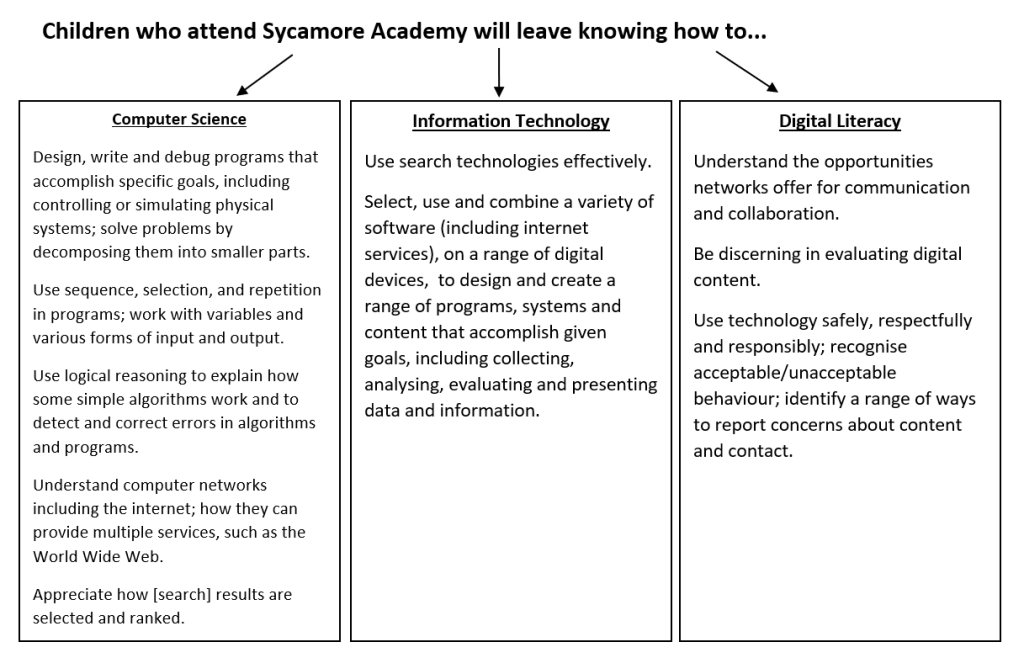
Implementation
Within each unit children will be given discreet teaching of computing skills as well as opportunity to apply skills independently. We use the D.A.R.E.S approach to structure each unit with children designing, applying, refining, evaluating and sharing projects. They will use a wide range of applications and software to develop the skills, set out in the planning, that they will be able to use in their wider lives. Through this approach we aim to inspire pupils and enable to see a real purpose for all of the skills and vocabulary they acquire. Children will also be given opportunities across the curriculum to continuously apply their computing skills in order to create content in other subject areas. Cross-curricular links are key to making computing purposeful to our students.
Our medium term plans allow for students to gain new skills, whilst building on prior knowledge from previous year groups. Our curriculum is split into the three disciplines of computing set out in the National Curriculum. In all key stages children develop skills in information technology, digital literacy and computer science. The content of the lessons focusses on developing computing skills with children creating content by applying learning from other subjects.
Our information technology units cover 8 key concepts; word processing, data handling, presentation, animation, video creation, photography and digital art, augmented and virtual reality and sound. These 8 key concepts run through the school from foundation stage to year 6 with children building on skills each year.
Our computer science units in FS and KS1 focus on computational thinking and coding and programming. In KS2 the concepts continue but the concept of networks is also introduced. As in the real world, when writing code and developing algorithms, children are encouraged to work together to simplify and debug their coding.
Digital literacy objectives are interwoven throughout our entire curriculum following the Education for a Connected World document. Again this is split into 8 key concepts; self-image and identity, online relationships, online reputation, online bullying, managing online information, health, well-being and lifestyle, privacy and security and copyright and ownership.
Resources are provided to support staff confidence with delivering the computing curriculum such as user guides and CPD videos. This enables staff to confidently plan their sequence of lessons and assess the children’s progress. Key vocabulary for each unit is also given so that staff can assess children’s ability to use computing vocabulary when discussing their work.
Impact
Our computing curriculum is designed to engage and inspire our students’ use of technology across the curriculum. We will constantly ask the WHY behind their learning and not just the HOW. We want our students to discuss, reflect and appreciate the impact computing has on their learning, development and well-being. Finding the right balance with technology is key to an effective education and a healthy life-style. We feel the way we implement computing helps our children realise the need for the right balance and one they can continue to build on in their next stage of education and beyond. We encourage regular discussions between staff and pupils to best embed and understand this. The way pupils showcase, share, celebrate and publish their work will best show the impact of our curriculum.
We also look for evidence through reviewing pupil’s knowledge and skills digitally through tools like Purple Mash and Seesaw and observing learning regularly. Progress of our computing curriculum is demonstrated through outcomes and the record of coverage in the process of achieving these outcomes. Children will be able to use digital and technological vocabulary accurately, alongside a progression in their technical skills.
A Sycamore child will be a respectful and confident digital citizen who goes on to have a happy and healthy digital life.
Useful Websites
